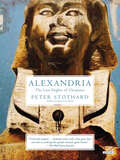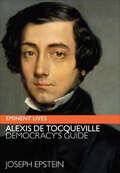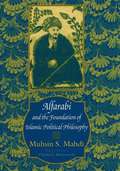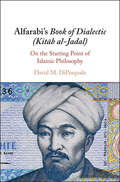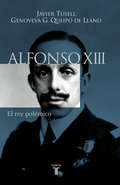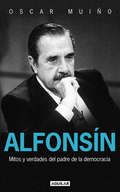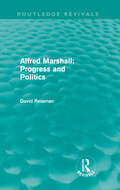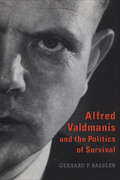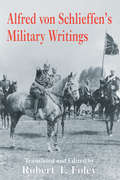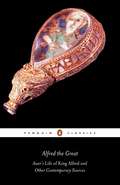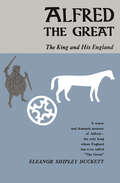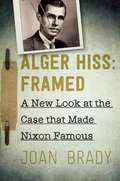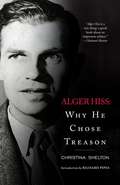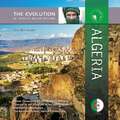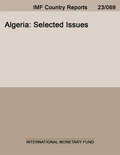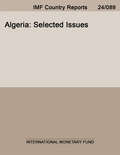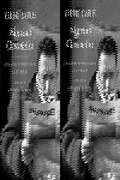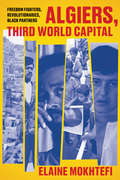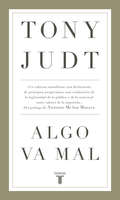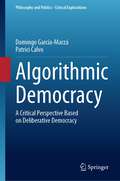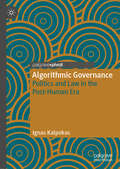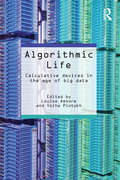- Table View
- List View
Alexandria: The Last Nights of Cleopatra
by Peter StothardA blend of memoir, history, and travelogue exploring the ancient Egyptian city on the eve of the Arab Spring: “Fresh and original . . . quietly virtuosic.” —The Wall Street JournalBlending aspects of memoir, history, and travel narrative into an elegant and unique tapestry, Peter Stothard uses the sights and sounds of the ancient city to reconnect with the experiences that shaped him and sparked a passionate interest in the life of Cleopatra. Melancholy, yet often humorous, Alexandria probingly deconstructs the enigma of modern Egypt—with its uneasy mix of classical touchstones and increasingly volatile Middle Eastern politics—and offers a firsthand glimpse into the fracturing state just before the Tahrir Square uprising and the start of the Arab Spring.Includes photographs“A thoroughly enjoyable combination of history, autobiography, travel and general musings about Alexandria . . . Don’t try to categorize this book; just read it and let it flow over you.” —Kirkus Reviews (starred review)“A chance trip to Alexandria and a lifelong love affair with Cleopatra coalesce . . . Staying in Alexandria’s Metropole Hotel and guided through the city by the at turns effusive and secretive Socratis and Mahmoud, Stothard relates not only his encounters with the remnants of Cleopatra throughout Alexandria but also the origins of his fascination with the Egyptian queen.” —Publishers Weekly
Alexis de Tocqueville: Democracy's Guide (Eminent Lives)
by Joseph EpsteinAlexis de Tocqueville was among the first foreigners to recognize the potential of a new land called the United States. His classic work Democracy in America, first published in 1835, was not only a vivid portrait of the new nation, but also a startlingly accurate forecast of its future. From the influence of evangelical Christianity to the advent of our “consumer society,” many of de Tocqueville’s predictions have come true. Bestselling author Joseph Epstein revisits de Tocqueville’s legacy, providing a fresh account of his classic travels in America. Epstein explains how de Tocqueville, introverted and prone to self-doubt, arrived at such a profoundly influential interpretation of this new country and its government. Alexis de Tocqueville: Democracy’s Guide is a compelling portrait of the Frenchman who would become an American icon. Joseph Epstein is the author of, among other books, Snobbery: The American Version, Fabulous Small Jews (a collection of stories), Envy, and Friendship: An Exposé. He was the editor of The American Scholar between 1974 and 1997, and for many years taught in the English Department at Northwestern University. His essays and stories have appeared in the New Yorker, Commentary, the Atlantic Monthly, and other magazines.
Alfarabi and the Foundation of Islamic Political Philosophy
by Muhsin S. MahdiIn this work, Muhsin Mahdi—widely regarded as the preeminent scholar of Islamic political thought—distills more than four decades of research to offer an authoritative analysis of the work of Alfarabi, the founder of Islamic political philosophy. Mahdi, who also brought to light writings of Alfarabi that had long been presumed lost or were not even known, presents this great thinker as his contemporaries would have seen him: as a philosopher who sought to lay the foundations for a new understanding of revealed religion and its relation to the tradition of political philosophy. Beginning with a survey of Islamic philosophy and a discussion of its historical background, Mahdi considers the interrelated spheres of philosophy, political thought, theology, and jurisprudence of the time. He then turns to Alfarabi's concept of "the virtuous city," and concludes with an in-depth analysis of the trilogy, Philosophy of Plato and Aristotle. This philosophical engagement with the writings of and about Alfarabi will be essential reading for anyone interested in medieval political philosophy.
Alfarabi's Book of Dialectic (Kitāb al-Jadal): On the Starting Point of Islamic Philosophy
by David M. DiPasqualeWidely regarded as the founder of the Islamic philosophical tradition, and as the single greatest philosophical authority after Aristotle by his successors in the medieval Islamic, Jewish, and Christian communities, Alfarabi was a leading figure in the fields of Aristotelian logic and Platonic political science. The first complete English translation of his commentary on Aristotle's Topics, Alfarabi's Book of Dialectic, or Kitāb al-Jadal, is presented here in a deeply researched edition based on the most complete Arabic manuscript sources. David M. DiPasquale argues that Alfarabi's understanding of the Socratic art of dialectic is the key prism through which to grasp his recovery of an authentic tradition of Greek science on the verge of extinction. He also suggests that the Book of Dialectic is unique to the extent to which it unites Alfarabi's logical and political writings, opening up novel ways of interpreting Alfarabi's influence.
Alfonso XIII. El rey polémico
by Javier TusellUna biografía de Alfonso XIII resulta imprescindible porque es uno de los protagonistas fundamentales de la historia española del siglo XX. Aunque Alfonso XIII es uno de los protagonistas fundamentales de la historia española edl siglo XX, a menudo no se ha profundizado suficientemente en la figura de este monarca. Poco controvertido en la mayor parte de su reinado pero blanco de todas las críticas en la fase final, Alfonso XIII sigue siendo hoy un rey polémico, incluso con mala fama en la memoria colectiva. Mientras que la derecha le ha acusado de falta de reacción frente a un parlamentarismo inestable y estéril, la izquierda le recuerda como un monarca autoritario y clerical, responsable del desastre de Annual y del golpe de Estado de 1923. Pero ¿cómo era verdaderamente el rey y qué papel desempeñó en la política del país? ¿Cómo funcionó el sistema de la Restauración y cuáles fueron sus posibilidades de evolución? ¿En qué consistió el difícil tránsito del liberalismo a la democracia y por qué no fue viable bajo el régimen monárquico? Este libro es fruto de toda una vida de dedicación por parte de los autores a este periodo cronológico pero también de la utilización de importantes fuentes rigurosamente inéditas. A partir de éstas se ha reconstruido de forma novedosa la trayectoria personal y política de Alfonso XIII, procurando hacerlo con imparcialidad, comparando su actuación con las de los otros reyes de la época y evitando anacronismos. Se ha tratado de comprender la personalidad - tanto en su faceta humana como política - de este monarca que accedió al trono en 1902, con dieciséis años de edad, y que abandonó España en 1931, haciendo un balance de sus rasgos positivos y negativos.
Alfonsín. Mitos y verdades del padre de la democracia
by Oscar MuiñoMitos y verdades del padre de la democracia. Puntero y estadista a la vez, tipificar a Raúl Alfonsín es tan difícil y fascinante como el mismo personaje. Podía tanto dialogar en pie de igualdad con Bill Clinton o con Felipe González como involucrarse en la conformación de una lista partidaria en el distrito más pequeño de la provincia de Buenos Aires. Quienes lo conocieron revelan en este libro un hombre en la intimidad familiar y en el ruedo político. Descuidado con las finanzas domésticas; audaz a la hora de trazar su propio camino partidario; decidido en l a defensa del régimen democrático; comprometido en la protección de los derechos humanos durante la dictadura. Tras levantar su voz para rechazar la recuperación de las islas Malvinas y exigir la restauración democrática luego de la caída de Puerto Argentino, derrotó por primera vez al peronismo en las urnas. Valiéndose de numerosos diálogos y testimonios de amigos, familiares, conocidos y adversarios, el periodista Oscar Muiño reconstruye la personalidad de un líder decisivo en la Argentina de las útlimas décadas del siglo pasado, cuya influencia sigue presente aun años después de su muerte.
Alfred Marshall's Mission (Routledge Revivals)
by David ReismanAlfred Marshall was anxious to do good. Intended by an Evangelical father for the vocation of clergyman, the author of the mould-shaping Principles of Economics remained to the end of his days a great preacher deeply committed to raising the tone of life. First published in 1990, Alfred Marshall’s Mission explains how this most moral of political economists sought to blend the downward sloping utility function of Jevons and Menger with the organic evolutionism of Darwin and Spencer, how this celebrated theorist of social alongside economic growth sought to combine the mathematical marginalism of Cournot. Thunen and Edgeworth with the ethical uplift of Green, Jowett and Toynbee. The conclusion reached is that perhaps Marshall was, after all, too anxious to do good. Far more economists, however, have been not anxious enough; and that in itself gives this study of Marshall’s life and times a present day relevance which would, no doubt, have appealed strongly to the shy Cambridge professor who is its subject.
Alfred Marshall: Progress And Politics (Routledge Revivals)
by David ReismanFirst published in 1987, Alfred Marshall: Progress and Politics provides an enlightening insight into Marshall's thoughts on social improvement, adaptive upgrading, policy and polity. He planned books on these subjects which he never subsequently wrote, but the thesis of this work is that a close study of such writings as Marshall did complete makes possible a very detailed reconstruction of the important contribution which Marshall was capable of making to Victorian evolutionary thought (much in the shadow of Darwin and Spencer). In the ongoing debate on the political element in political economy, he reveals himself to have been as much an eclectic as was Adam Smith and as much a man of commitment as was T. H. Green.
Alfred Valdmanis and the Politics of Survival
by Gerhard P. BasslerAlfred Valdmanis is best known in Canada for his infamous role in Premier Joey Smallwood's scheme to industrialize Newfoundland. A Latvian immigrant, he was appointed Director General of Economic Development in 1950 with the understanding that through his connections to Europe he could entice German and Baltic industrialists to the isolated, rural island. His influence was brought to an abrupt end when, in 1954, he was charged with defrauding the government. The media, latching on to his murky past and his possible affiliation with war criminals, made him the scapegoat of Newfoundland's problems, painting him as part comedian, part sinister villain. This was not the first time his name was connected with controversial issues. Valdmanis's wily political manoeuvring is more the stuff of fiction than history. Between 1938, at age 29, and his ironic downfall in the safe haven of Canada, he was a finance minister of pre-war Latvia, a government official during the Soviet invasion, a shrewd collaborator under the Nazi occupation, then, a friend to the Allies, a spokesman for Latvian POW and displaced persons, and an adviser to the government of Canada. In this first serious biography of Alfred Valdamis historian Gerhard Bassler casts the story of this political manipulator and chameleon in new terms: the often tragic consequences of the will to survive.
Alfred Von Schlieffen's Military Writings (Military History and Policy)
by Robert T. FoleyA collection of some of the writings of Generalfeldmarschall Alfred Graf von Schlieffen, one of the more intriguing of Imperial Germany's military figures. Schlieffens 15 years as Chief of the General staff left a stamp upon both military and political institutions of Wilhelmine Germany.
Alfred the Great: Asser's Life of King Alfred and Other Contemporary Sources
by AsserAsser's Life of King Alfred, written in 893, is a revealing account of one of the greatest of medieval kings. Composed by a monk of St David's in Wales who became Bishop of Sherborne in Alfred's service and worked with him in his efforts to revive religion and learning in his kingdom, this life is among the earliest surviving royal biographies. It is an admiring account of King Alfred's life, written in absorbing detail - chronicling his battles against Viking invaders and his struggle to increase the strength and knowledge of his people, and to unite his people at a time of conflict, uncertainty and war.
Alfred the Great: The King and His England (Phoenix Books)
by Eleanor Shipley DuckettFrom the author of The Gateway to the Middle Ages, &“a fascinating portrait of an enlightened monarch against a background of darkness and ignorance&” (Kirkus Reviews). Filled with drama and action, here is the story of the ninth-century life and times of Alfred—warrior, conqueror, lawmaker, scholar, and the only king whom England has ever called &“The Great.&” Based on up-to-date information on ninth-century history, geography, philosophy, literature, and social life, it vividly presents exciting views of Alfred in every stage of his long career and leaves the reader with a sharply etched picture of the world of the Middle Ages.
Alger Hiss: A New Look at the Case that Made Nixon Famous
by Joan BradyA clear-eyed investigation into what is probably the biggest, longest cover-up in American history.As a member of the House Un-American Activities Committee, Richard Nixon led the investigations that first drew attention to Alger Hiss and his purported ties to the Soviet regime. These investigations eventually led to the discovery of proof that Hiss was a mole in the State Department and precipitated a trial that would eventually ruin him and propel Nixon to the Presidency.But what if the proof that eventually led to Hiss’s conviction was forged?In this riveting investigation, Joan Brady?winner of The Whitbread Book of the Year?reveals how Nixon manipulated a media and public in the thrall of post-war anti-communist hysteria to make a fabricated case against Hiss, and draws a strong parallel with the French, who a half-century before turned Alfred Dreyfus into a scapegoat for anti-Semitism.Alger Hiss: Framed is necessary and timely, telling soberly the tale of a nation in the grip of paranoid fear and the man who took most advantage of this fear.Skyhorse Publishing, along with our Arcade, Good Books, Sports Publishing, and Yucca imprints, is proud to publish a broad range of biographies, autobiographies, and memoirs. Our list includes biographies on well-known historical figures like Benjamin Franklin, Nelson Mandela, and Alexander Graham Bell, as well as villains from history, such as Heinrich Himmler, John Wayne Gacy, and O. J. Simpson. We have also published survivor stories of World War II, memoirs about overcoming adversity, first-hand tales of adventure, and much more. While not every title we publish becomes a New York Times bestseller or a national bestseller, we are committed to books on subjects that are sometimes overlooked and to authors whose work might not otherwise find a home.
Alger Hiss: Why He Chose Treason
by Christina SheltonIn 1948, former U.S. State Department official Alger Hiss was accused of being a Soviet spy. Because the statute of limitations on espionage had run out, he was convicted only of perjury. Decades later--after the Hiss trial had been long forgotten by most--archival evidence surfaced confirming the accusations: a public servant with access to classified documents had indeed passed crucial information to the Soviets for more than a decade. Yet many on the American Left still consider Hiss an iconic figure--an innocent victim accused of unsubstantiated crimes. They prefer to focus on the collectivist ideals Hiss stood for, rather than confront the reality of a man who systematically and methodically betrayed his country. Former U.S. Intelligence analyst Christina Shelton employs an in-depth knowledge of Soviet intelligence affairs as well as recently released Hungarian and KGB archival material to shine a fresh light on one of the most famous espionage cases. The story is dramatic, but Shelton's analysis goes beyond sensationalism as she explores both the ideological motivation behind Hiss's behavior and the lasting influence it has had on U.S. foreign policy. Why exactly were the intellectual elite so deter-mined that Hiss was innocent? His accuser, Time magazine senior editor Whittaker Chambers--originally Hiss's Soviet handler--presented compelling written evidence. However, the intelligentsia were intent on supporting one of their own. They ignored the facts, a willful blindness that helped contribute to a polarization still in place in our country today. Thirty years of intelligence analysis gives Shelton the expertise to approach the story from many different angles, especially: * Her persuasive argument that Communism and Fascism are not polar opposites, as has so long been claimed, but highly similar ideologies. * How Hiss's central role at the Yalta Conference and the founding of the United Nations are examples of the significance of Soviet intelligence recruitment of high-level Americans who could influence U.S. foreign policy in their favor. * Why the silence surrounding the implications of Hiss's espionage continues--and why apologists fear that smearing his name would undercut New Deal policies and the United Nations. Shelton doesn't just detail the body of evidence pointing to Hiss's guilt; she suggests new layers of meaning in light of the current political landscape. Today, the importance of understanding Hiss's ideological commitment has never been more vital. His advocacy of collectivism and internationalism still resonate among the political elite, making this book an important and timely analysis of American thought at this critical juncture in our country's life.
Algeria (The Evolution of Africa's Major Nations)
by Daniel E. HarmonThe vast North African country of Algeria became independent in 1962 after a brutal eight-year-long war against France. Unfortunately, Algeria has not had a stable history, as various leaders have seized power through military coups. In 1991 a rising Islamist movement in the country led to a civil war that lasted for more than a decade and resulted in over 150,000 deaths. Algerians are still attempting to put the tragedies of the past behind them and rebuild their country. Algeria is fortunate to control many important resources, including vast reserves of oil and national gas. However, since 2011 there have been numerous protests against the government, with people demanding more jobs, better housing, and a more open and transparent political system. Much work must be done to ensure a peaceful and prosperous future for all Algerians.
Algeria: Selected Issues
by International Monetary FundA report from the International Monetary Fund.
Algeria: Selected Issues (Imf Staff Country Reports #Country Report No. 14/342)
by International Monetary Fund. Middle East and Central Asia Dept.A report from the International Monetary Fund.
Algeria: Selected Issues Paper (Imf Staff Country Reports #Country Report No. 14/342)
by International Monetary Fund. Middle East and Central Asia Dept.A report from the International Monetary Fund.
Algeria: Stabilization and Transition to the Market
by Karim Nashashibi Patricia Alonso-Gamo Stefania Bazzoni Alain Féler Nicole Laframboise Sebastian Paris HorvitzThis paper offers Algeria's recent experience with macroeconomic stabilization and systemic transformation from a centrally planned to a market economy. the analyses focuses on the period since 1994 when Algeria embarked on a comprehensive reform program that has benefitted from IMF support, first through a one-year Stand-by Arrangement, and from May 1995, through a three-year arrangement under the Extended Fund Facility. to better understand this experience, this paper provides some background information on Algeria's political history and economic developments during the period preceding the Stand-By arrangement.
Algerian Chronicles
by Albert CamusMore than 50 years after independence, Algerian Chronicles, with its prescient analysis of the dead end of terrorism, appears here in English for the first time. Published in France in 1958-the year the war caused the collapse of the Fourth French Republic-it is one of Albert Camus’ most political works: an exploration of his commitment to Algeria.
Algiers, Third World Capital: Freedom Fighters, Revolutionaries, Black Panthers
by Elaine MokhtefiA fascinating portrait of life with the Black Panthers in Algiers: a story of liberation and radical politicsFollowing the Algerian war for independence and the defeat of France in 1962, Algiers became the liberation capital of the Third World. Elaine Mokhtefi, a young American woman immersed in the struggle and working with leaders of the Algerian Revolution, found a home here. A journalist and translator, she lived among guerrillas, revolutionaries, exiles, and visionaries, witnessing historical political formations and present at the filming of The Battle of Algiers.Mokhtefi crossed paths with some of the era’s brightest stars: Frantz Fanon, Stokely Carmichael, Timothy Leary, Ahmed Ben Bella, Jomo Kenyatta, and Eldridge Cleaver. She was instrumental in the establishment of the International Section of the Black Panther Party in Algiers and close at hand as the group became involved in intrigue, murder, and international hijackings. She traveled with the Panthers and organized Cleaver’s clandestine departure for France. Algiers, Third World Capital is an unforgettable story of an era of passion and promise.
Algo va mal
by Tony JudtHa llegado el momento de detenernos a decidir en qué mundo queremos vivir. Un apasionado llamamiento a resucitar los valores colectivos y el compromiso político. Hay algo profundamente erróneo en la forma en que vivimos hoy. El estilo egoísta de la vida contemporánea, que nos resulta «natural», y también la retórica que lo acompaña (una admiración acrítica hacia los mercados no regulados, el desprecio por el sector público, la ilusión del crecimiento infinito) se remonta tan sólo a la década de los ochenta. En los últimos treinta años hemos hecho una virtud de la búsqueda del beneficio material hasta el punto de que eso es todo lo que queda de nuestro sentido de un propósito colectivo. «¿Por qué nos hemos apresurado tanto en derribar los diques que laboriosamente levantaron nuestros predecesores? ¿Tan seguros estamos de que no se avecinan inundaciones?», se preguntaJudt, uno de los más importantes pensadores contemporáneos. Rechazando tanto el individualismo extremo de la derecha como la desacreditada pose retórica de la izquierda, Judt nos desafía a oponernos a los males de nuestra sociedad y a afrontar nuestra responsabilidad sobre el mundo en que vivimos. Algo va mal es un inestimable obsequio para las futuras generaciones de ciudadanos comprometidos. Expresión concentrada de las preocupaciones de toda una vida, este libro pasará a formar parte de los grandes textos políticos de nuestra era. Reseñas:«Un valeroso manifiesto: una declaración de principios progresistas, una vindicación de la legitimidad de lo público y de lo universal como valores de la izquierda.»Antonio Muñoz Molina «Judt ha creado un manifiesto para los jóvenes desilusionados con la política del libre mercado que buscan soluciones. Y aunque suscita tantas preguntas como responde, éstos encontrarán pocas obras más inspiradoras que este libro elegante, valiente y profundamente humano.»The Sunday Times
Algorithmic Democracy: A Critical Perspective Based on Deliberative Democracy (Philosophy and Politics - Critical Explorations #29)
by Domingo García-Marzá Patrici CalvoBased on a deliberative democracy, this book uses a hermeneutic-critical methodology to study bibliographical sources and practical issues in order to analyse the possibilities, limits and consequences of the digital transformation of democracy. Drawing on a two-way democracy, the aim of this book is intended as an aid for thinking through viable alternatives to the current state of democracy with regard to its ethical foundations and the moral knowledge implicit in or assumed by the way we perceive and understand democracy. It is intended to stimulate reflection and discussion on the basis that, by addressing what we understand as democracy, we can inevitably influence the reality known as democracy. Democracy’s evident regression in today’s world makes this all too apparent: it has become a hostage to all kinds of autocracies and technopopulisms, which are supported to a greater or lesser extent by the current algorithmic revolution.
Algorithmic Governance: Politics and Law in the Post-Human Era
by Ignas KalpokasThis book analyses the changes to the regulation of everyday life that have taken place as a result of datafication, the ever-growing analytical, predictive, and structuring role of algorithms, and the prominence of the platform economy. This new form of regulation – algorithmic governance – ranges from nudging individuals towards predefined outcomes to outright structuration of behaviour through digital architecture. The author reveals the strength and pervasiveness of algorithmic politics through a comparison with the main traditional form of regulation: law. These changes are subsequently demonstrated to reflect a broader shift away from anthropocentric accounts of the world. In doing so, the book adopts a posthumanist framework which focuses on deep embeddedness and interactions between humans, the natural environment, technology, and code.
Algorithmic Life: Calculative Devices in the Age of Big Data
by Louise Amoore Volha PiotukhThis book critically explores forms and techniques of calculation that emerge with digital computation, and their implications. The contributors demonstrate that digital calculative devices matter beyond their specific functions as they progressively shape, transform and govern all areas of our life. In particular, it addresses such questions as: How does the drive to make sense of, and productively use, large amounts of diverse data, inform the development of new calculative devices, logics and techniques? How do these devices, logics and techniques affect our capacity to decide and to act? How do mundane elements of our physical and virtual existence become data to be analysed and rearranged in complex ensembles of people and things? In what ways are conventional notions of public and private, individual and population, certainty and probability, rule and exception transformed and what are the consequences? How does the search for ‘hidden’ connections and patterns change our understanding of social relations and associative life? Do contemporary modes of calculation produce new thresholds of calculability and computability, allowing for the improbable or the merely possible to be embraced and acted upon? As contemporary approaches to governing uncertain futures seek to anticipate future events, how are calculation and decision engaged anew? Drawing together different strands of cutting-edge research that is both theoretically sophisticated and empirically rich, this book makes an important contribution to several areas of scholarship, including the emerging social science field of software studies, and will be a vital resource for students and scholars alike.
